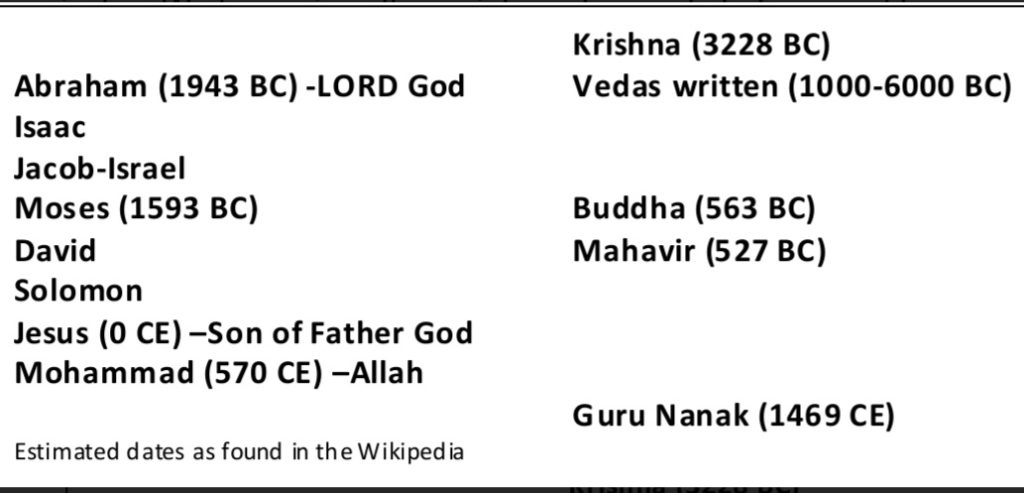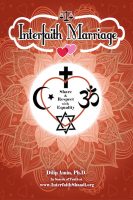Section 12.1: Scriptures and Interfaith Marriages
Religions and scriptures are the guiding principles of life for many. Dharmic and Abrahamic religious chornology is shown in Figure 3. Most of the time, scriptures teach us to live in peace and harmony with others. There are many pluralistic themes in different scriptures like Lord Jesus guiding us to “Love thy neighbors,” (Matthew 22:39) Allah stating, “To you We have given the scriptures, just as We have given the scriptures to people before you (Jews, Christians, Hindus, Buddhists, etc.)” and Lord Krishna’s message, “Who is friendly to every living being—he certainly comes to Me.” (Geeta 11:55) In spite of God’s many inclusivist and loving messages, millions have been killed in His/Her name. Is this due to conflicting messages given by God or is it human’s inability to comprehend God’s true message? Assuming the latter, the author recommends all interfaith couples not to get stuck on scriptures and instead learn to enjoy Interfaith Marriage with Equality.

Figure 3: Religious Chronology
Considering many unifying themes in different scriptures will not hurt interfaith dating couples if they were not aware of them, the author has focused in this book on quotes which may be potentially interpreted as objectionable from an inclusivist viewpoint. Select verses/ayat/stanza from different scriptures are listed in the following sections that the interfaith dating couples should know.
- The Geeta on Abrahamic? (Section 12.2)
- The Torah on Hindus? (Section 12.3)
- Bat Mitzvah on Hindus? (Section 12.4)
- The Bible on Hindus? (Section 12.5)
- The Koran on Hindus? (Section 12.6)
- The Koran on Christians and Jews? (Section 12.7)
It is possible that some Hindus as well as Abrahamics may find that listing these verses without detailed explanations for each in this book is
not appropriate. The author recommends an interfaith dating couple to read respective scriptures for full context and discuss together how these select verses may impact their planned married life.
While consulting with more than 900 interfaith dating youths over the past 9 years, the author has learned that—initially, the majority of interfaith dating youths don’t have interest in religious scriptures. However, this changes later when the relationship gets serious. Sometimes, increased interest in one’s religion/scripture by the intended spouse could be a warning sign of trouble on the way; for example, the reason for initiating discussion on “Who is God?” and comparison of two scriptures may be to ultimately prove superiority of one’s faith over the other. The proposition to agree on “We will not idol-worship” is to convince the other that “Your idols are idols, while my idols are Godly.” The talk of “Children may get confused in two religions” is meant to say, “Children should follow my faith and not yours.” The objective of “ONE God” talk could be to express religious exclusivity that “There is ONE God and that is MINE!” Love proselytism precedes disclosure of the need of religious conversion for marriage. It is hoped that the following sections will help dating people be better prepared against a potential religious fanatic.
The author believes happy and successful interfaith marriage is possible provided the couple has true respect for each other’s beliefs and has learned to interpret scriptures in their historical context.

Next Section, Next Chapter, Prior Section, Prior Chapter

A Chapter from the book Interfaith Marriages: Share and Respect with Equality is posted here. View some of others chapters from the book here.
Video messages by the author
How to purchase the book (as low as Rs.270 or $14.99).
Return to Home, Blogs, How to Share? Facebook, Youtube, Twitter, Book, Media.

